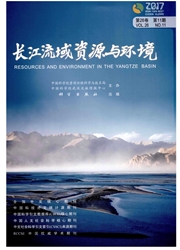

 中文摘要:
中文摘要:
作为地区经济发展的重要载体,开发区在带动区域产业发展和城市化水平提高方面具有重要意义。然而,由于存在功能定位不清、产业结构趋同等问题,开发区的规模效应和集聚效应并未得到充分体现,土地浪费与低效利用现象仍然存在。采用统计模型分析法和特尔菲法,对江苏省开发区土地集约利用进行定量化评价,并试图探讨集约度的合理水平和促进土地集约利用的途径与措施。研究结果表明,江苏省开发区土地集约利用整体水平较高,但存在地区间和地区内部的差异;经济发展水平、产业政策和用地结构是影响开发区土地集约利用的几大因素。因此,应结合地区经济发展现状与趋势,根据各开发区土地利用的相对集约综合指数值和绝对集约综合指数值的大小以及资源的消耗情况,加快产业政策及用地结构的调整,并制定相应的土地集约利用经济激励机制和措施。
 英文摘要:
英文摘要:
As an important base for regional economical development, a development zone means a great deal in driving the development of regional industry and improving the urbanization level. However, because of mal-function orientation, same-configuration of industry, and low-efficiency to some extent in the use of land, the effect of scale and convergence in development zones is not obviously embodied. The purpose of the paper is to evaluate the land use intensity in different development zones in Jiangsu Province by fixed quantificaiton method in order to make the standard of land intensity and put forward countermeasures to improve the level of land use intensity in development zones. Method of statistical analysis and Delphi were employed in this article. The result of the paper suggests that the level of land use intensity in development zones in Jiangsu Province is rather high, while at the same time the level of land use intensity is different in different development zones and even in the same development zone. Also, the level of economic development, the industry policies and the structure of land use are the three main factors affecting the level of land use intensity in development zones in Jiangsu province. So, a conclusion is gained that it is necessary to adjust the policies of industry and land use structure, and to make corresponding policies for the full use of land in development zones based on the present economic situation and the development direction and in accordance with the relative and the utter land use intensity and the resource consumption situation.
 同期刊论文项目
同期刊论文项目
 同项目期刊论文
同项目期刊论文
 期刊信息
期刊信息
